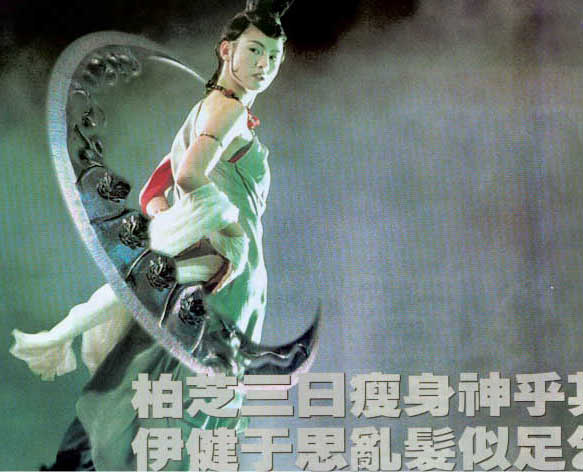The Legend of Zu
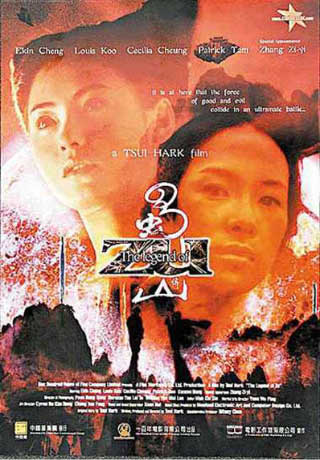
Reviewed by YTSL
Back in 1983, Tsui Hark introduced Hong Kong movie
viewers to the fantastical world of “Zu: Warriors of the Magic Mountain”.
Although quite a few individuals hail that pioneering work as a masterpiece,
I have to confess to not having checked it out yet (for a number of reasons,
including my fearing that I’d find its undoubtedly dated special effects
to be too cheesy for my tastes). Instead, my introduction to the Zu
universe has come by way of a newer Tsui offering that is not a sequel, prequel
nor an actual remake of the now 50 year old auteur’s earlier epic – that
starred the likes of Adam Cheng, Yuen Biao, Moon Lee and Brigitte Lin Ching-Hsia
-- but, rather, looks to be a different imagining of that fantasy space somewhere
in and above Sichuan, and its god-like – in terms of the supernatural powers
they possess, if nothing else -- warring “good” and “evil” clans.
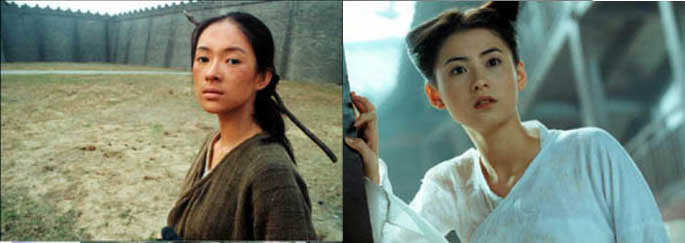
While viewing – and being befuddled, when not bored, by -- THE LEGEND OF
ZU, there was a part of me that wondered whether Tsui Hark was expecting
that whose international rights have been acquired by Miramax’s audience
to be intimately familiar with the story and characters he has put onto celluloid.
In any case, I definitely felt that I was crucially missing an explanation
re why the piece’s good guys and gals could be as automatically assumed to
be such as they evidently were (beyond the fact of their coming in the form
of the likes of Ekin Cheng and Cecilia Cheung, and one of the two characters
Cecilia Cheung portrayed being made up to look very much like the Ice Countess
essayed by Brigitte Lin in “Zu 1”). Similarly, while the not terribly
menacingly named Insomnia was obviously intent on gobbling up the powers
possessed by the different Zu clans, I fail to be convinced that his/her/its
ambition made him/her/it scarily evil to the point of being anywhere near
Lucifer’s league.
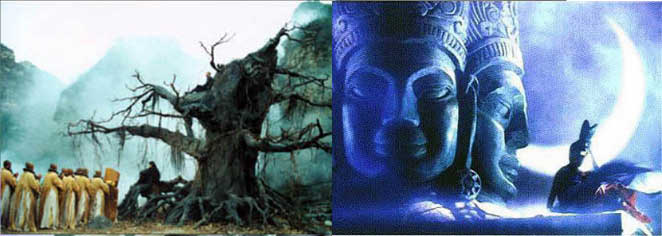
Without this surely fundamental contextualizing framework, the often visually
spectacular battles waged by not particularly well-named heroes and heroines
like King Sky (Ekin Cheng plays the sole survivor of a deadly attack on the
Kun Lun Clan), Enigma (this one character of Cecilia Cheung is the wielder
of the female gendered Heaven Sword), Red (Louis Koo portrays the Omei Clan’s
head student) and Thunder (Jacky Wu’s character’s Thunder Sword is the yang
twin of Enigma’s Heaven Sword) against a shape-changing Insomnia (whose physical
manifestations include one essayed by Kelly Lin) lack a true imperative and
sense of urgency. On account of THE LEGEND OF ZU not having much more
plot besides the one in which nominally good clans are threatened by a force
they perceive to be evil and consequently deciding to band together to put
a stop to its growth and movement through plus across their realm, this presented
a real problem – which manifested itself as a mind-numbing result -- to this
(re)viewer.

On balance though, I think that my (previous) lack of knowledge about the
Zu universe might well be for the best; what with my having a strong suspicion
that many who hold dear the first Zu film will really hate THE LEGEND OF
ZU for sullying the image – and their memories – of the offering that could
be said to have sent Tsui Hark on the road to what he is today: I.e.,
a respected individual among Hong Kong movie-makers, albeit one who has yet
to successfully break into Hollywood proper. Something else worth keeping
in mind is that many of the presumed members of Miramax’s proposed audience
for the prolific and ambitious Tsui’s latest – and surely most CGI-laden
ever – offering will be equally, if not more, ignorant than me with regards
to the Vietnam born director’s previous fantasy creation(s). And while
it could be argued that much of the impact of Ang Lee’s now (in)famous martial
masterpiece was derived from many of its effects and ideas being so very
novel to those who had not been fans of Hong Kong movies and/or reading wuxia
works, here’s pointing out that the seriously boring wanna-be epic whose
opening credits list Harvey and Bob Weinstein among its producers is light
years away from being this (or next) year’s “Crouching Tiger, Hidden Dragon”
in transnational -- plus American art-house to multiplex -- cross-over possibility
and overall quality.
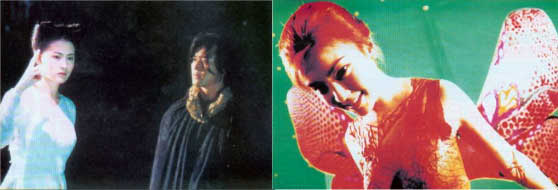
Although Tsui had Yuen Woo Ping as THE LEGEND OF ZU’s action director (and
Zhang Ziyi – in a blatantly commercial move -- among its cast members), the
fights in this movie are more likely to bring to mind video game affairs
than any wire-enhanced -- but still human powered and often gravity-bound
(even if people behave like they’re on the surface of the moon rather than
earth) -- battles. Despite Poon Hang Seng and Herman Yau being
two of the lengthy (feeling) effort’s three credited cinematographers, most
of what appears on screen looks less to be their output than that which was
generated by computers and (those) technicians whose instincts are more mechanical
than artistic in nature. Additionally, the one returnee from the 1983
“Zu” cast -- Sammo Hung, playing a similarly long-eye browed character known
here as White Brows – only succeeds in showing people that he possesses more
than just a larger amount of physical weight than all of the generally disappointing
film’s other principal actors and actresses (among whom number a couple of
Cantopop idols, a former male model and someone who was but an aspiring ballerina
not so long ago).
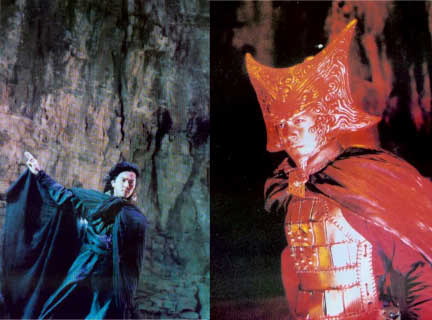
One question that undeniably will be on some minds, post reading this review
and/or viewing THE LEGEND OF ZU is: Has Tsui Hark lost his magic touch?
While I dearly do hope that this is not the (permanent) case, it cannot be
denied that few of his works after “The Chinese Feast” and “The Blade” have
been commercial mega hits and/or critically acclaimed. While I don't
dislike this uninspiring fantasy film as much as "Time and Tide" (a
manic offering I had such adverse reactions to that I can't bring myself
to spend time and effort writing a review for it), I can't say that
this sleep-inducing - and in a Mongkok cinema, to boot! – work has (re)assured
me that the man who played a big part in making me the Hong Kong film
fan(atic) that I am is anything like the master auteur of earlier decades.
Indeed, until he stops playing with computers and being fixated with
(visually) impressing rather than communicating, commenting, educating,
enthralling or just plain entertaining, I see no reason why I should
opt to view his current and future output instead of, say, the just
as - or maybe even less - CGI filled and dependent "Jurassic Park 3"
and its often equally soul-less Hollywood ilk.
My rating for this film: 4.5
